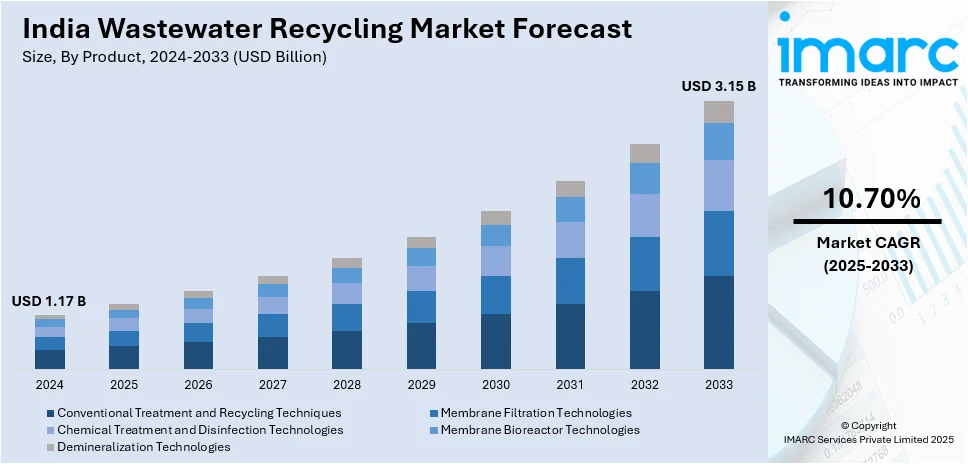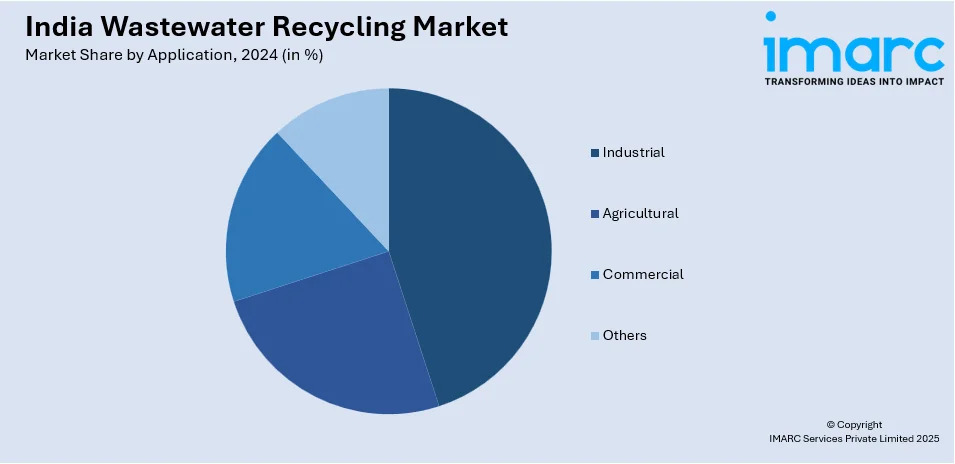
India Wastewater Recycling Market Size, Share, Trends and Forecast by Product, Application, and Region, 2025-2033
India Wastewater Recycling Market Overview:
The India wastewater recycling market size reached USD 1.17 Billion in 2024. Looking forward, IMARC Group expects the market to reach USD 3.15 Billion by 2033, exhibiting a growth rate (CAGR) of 10.70% during 2025-2033. The growth of the market is largely driven by increasing urbanization, growing water scarcity, stricter environmental laws, and rising demand for sustainable water management practices across industries. These factors altogether drive the need to implement cutting-edge wastewater treatment and recycling solutions in order to provide environmental sustainability and fulfill the expanding water requirements.
|
Report Attribute
|
Key Statistics
|
|---|---|
|
Base Year
|
2024 |
|
Forecast Years
|
2025-2033
|
|
Historical Years
|
2019-2024
|
| Market Size in 2024 | USD 1.17 Billion |
| Market Forecast in 2033 | USD 3.15 Billion |
| Market Growth Rate 2025-2033 | 10.70% |
India Wastewater Recycling Market Trends:
Adoption of Advanced Treatment Technologies
Due to the limitations of traditional wastewater treatment technologies, there is a growing trend towards new technologies like membrane filtration, reverse osmosis, and advanced oxidation processes. These technologies provide greater efficiency in contaminant removal, and treated wastewater can be reused in different industries and agriculture. Inclusion of Internet of Things (IoT) solutions continues to expand monitoring and optimization with real-time water quality analysis and system performance monitoring. Such technology advancement not only enhances compliance with environmental policies but also saves operation costs and assists in sustainable water management practice. For instance, in May 2024, Schneider Electric automated India’s largest single-stage wastewater treatment plant in Delhi, supporting the Namami Gange initiative. Constructed by SUEZ under the Delhi Jal Board Yamuna Action Plan, the plant treats 564 million liters per day, serving 30 million residents. Schneider’s EcoStruxure platform ensures operational efficiency and sustainability, with 50% of the plant’s energy needs met through biogas. This automation enhances water quality, reduces pollution, and supports self-sufficiency.

To get more information of this market, Request Sample
Emphasis on Decentralized Wastewater Treatment Systems
There is increased interest in the adoption of decentralized wastewater treatment systems, especially in urban and peri-urban settings. The systems treat wastewater at or near the point of origin, thus alleviating the load for centralized treatment plants and saving on infrastructure costs. Decentralized strategies are particularly useful in areas with limited sewer networks, providing scalable and flexible solutions that can be adapted to suit specific local requirements. This can fit into the larger goal of improving wastewater management effectiveness and extending treatment coverage to various geographic locations. For instance, in October 2024, the Government of India (GoI) introduced regulations mandating bulk consumers using over 5,000 litres of water daily to implement wastewater treatment. By 2031, new users must reuse 50% of wastewater, while existing users face a 25% target. Residential societies will start with 20% reuse in FY28, rising to 50% by FY31. Led by the Ministry of Environment, Forest, and Climate Change, the initiative promotes water conservation, reduces reliance on centralized plants, lowers infrastructure costs, and supports localized treatment.
Integration of Circular Economy Principles
The wastewater recycling market in India is increasingly embracing circular economy principles, focusing on resource recovery and reuse. Treated wastewater is being repurposed for non-potable applications such as industrial processes, irrigation, and groundwater recharge, thereby conserving freshwater resources. For instance, in December 2024, the Greater Noida Authority announced plans to construct five new sewage treatment plants (STPs) to enhance wastewater recycling. These include a 45 MLD plant in Sector 1, a 12 MLD plant in IT City, a 50 MLD plant in Knowledge Park V, a 42 MLD plant in Ecotech VI, and a 72 MLD plant in Sector MU Recreational Green. The IT City STP has received Rs 40 crore in funding and approval from IIT-Delhi, with construction expected to commence within months. These initiatives aim to meet the city's growing sewage treatment needs and promote water conservation. Additionally, by-products like biogas and biosolids are being extracted during the treatment process for energy generation and soil conditioning, respectively. This holistic approach not only mitigates environmental impact but also creates economic opportunities, fostering a sustainable and resilient water management framework.
India Wastewater Recycling Market Segmentation:
IMARC Group provides an analysis of the key trends in each segment of the market, along with forecasts at the region/country level for 2025-2033. Our report has categorized the market based on product and application.
Product Insights:
- Conventional Treatment and Recycling Techniques
- Membrane Filtration Technologies
- Chemical Treatment and Disinfection Technologies
- Membrane Bioreactor Technologies
- Demineralization Technologies
The report has provided a detailed breakup and analysis of the market based on the product. This includes conventional treatment and recycling techniques, membrane filtration technologies, chemical treatment and disinfection technologies, membrane bioreactor technologies, and demineralization technologies.
Application Insights:

- Industrial
- Agricultural
- Commercial
- Others
A detailed breakup and analysis of the market based on the application have also been provided in the report. This includes industrial, agricultural, commercial, and others.
Regional Insights:
- North India
- South India
- East India
- West India
The report has also provided a comprehensive analysis of all the major regional markets, which include North, South, East, and West India.
Competitive Landscape:
The market research report has also provided a comprehensive analysis of the competitive landscape. Competitive analysis such as market structure, key player positioning, top winning strategies, competitive dashboard, and company evaluation quadrant has been covered in the report. Also, detailed profiles of all major companies have been provided.
India Wastewater Recycling Market News:
- In May 2024, Sustainable Biosolutions Pvt Ltd (SUSBIO) launched SUSBIO ECOTREAT, a compact, low-maintenance sewage treatment system offering eco-friendly wastewater management. Using an anoxic, aerobic, and membrane treatment process, it ensures high water quality with minimal energy consumption.
- In January 2024, Emerald made its first investment in South Asia by supporting INDRA, an Indian company offering electro-coagulation (EC) and electro-oxidation (EO) solutions for industrial wastewater management. EC removes pollutants using electrodes, while EO targets persistent contaminants. These methods are more efficient and space-saving than chemical coagulation, making them ideal for Asia’s water-scarce regions. With India’s water scarcity projected to affect 550 million people by 2050, Emerald's investment reflects its commitment to sustainable water management solutions in the region.
India Wastewater Recycling Market Report Coverage:
| Report Features | Details |
|---|---|
| Base Year of the Analysis | 2024 |
| Historical Period | 2019-2024 |
| Forecast Period | 2025-2033 |
| Units | Billion USD |
| Scope of the Report |
Exploration of Historical Trends and Market Outlook, Industry Catalysts and Challenges, Segment-Wise Historical and Future Market Assessment:
|
| Products Covered | Conventional Treatment and Recycling Techniques, Membrane Filtration Technologies, Chemical Treatment and Disinfection Technologies, Membrane Bioreactor Technologies, Demineralization Technologies |
| Applications Covered | Industrial, Agricultural, Commercial, Others |
| Regions Covered | North India, South India, East India, West India |
| Customization Scope | 10% Free Customization |
| Post-Sale Analyst Support | 10-12 Weeks |
| Delivery Format | PDF and Excel through Email (We can also provide the editable version of the report in PPT/Word format on special request) |
Key Questions Answered in This Report:
- How has the India wastewater recycling market performed so far and how will it perform in the coming years?
- What is the breakup of the India wastewater recycling market on the basis of product?
- What is the breakup of the India wastewater recycling market on the basis of application?
- What are the various stages in the value chain of the India wastewater recycling market?
- What are the key driving factors and challenges in the India wastewater recycling market?
- What is the structure of the India wastewater recycling market and who are the key players?
- What is the degree of competition in the India wastewater recycling market?
Key Benefits for Stakeholders:
- IMARC’s industry report offers a comprehensive quantitative analysis of various market segments, historical and current market trends, market forecasts, and dynamics of the India wastewater recycling market from 2019-2033.
- The research report provides the latest information on the market drivers, challenges, and opportunities in the India wastewater recycling market.
- Porter's Five Forces analysis assist stakeholders in assessing the impact of new entrants, competitive rivalry, supplier power, buyer power, and the threat of substitution. It helps stakeholders to analyze the level of competition within the India wastewater recycling industry and its attractiveness.
- Competitive landscape allows stakeholders to understand their competitive environment and provides an insight into the current positions of key players in the market.
Need more help?
- Speak to our experienced analysts for insights on the current market scenarios.
- Include additional segments and countries to customize the report as per your requirement.
- Gain an unparalleled competitive advantage in your domain by understanding how to utilize the report and positively impacting your operations and revenue.
- For further assistance, please connect with our analysts.
 Request Customization
Request Customization
 Speak to an Analyst
Speak to an Analyst
 Request Brochure
Request Brochure
 Inquire Before Buying
Inquire Before Buying




.webp)




.webp)












